March is Bleeding Disorders Awareness Month (BDAM) and throughout BDAM and up until World Hemophilia Day on April 17th we will be focusing our fundraising efforts on our scholarship program which includes our Lyman Fisher Scholarship, travel grants for national meetings, and our Terry Lamb Enrichment Scholarship. With your help our goal is to raise at least $6,000 from our amazing community of donors, constituents and supporters!
In an effort to raise awareness, we will be highlighting the stories of VHF Hope Society donors like Sarahbeth Spasojevich and sharing why the work of VHF motivated them to become monthly donors. We hope Sarahbeth’s story inspires you to give today!
What motivated you to become a monthly donor to the VHF Hope Society?
This organization has meant a lot to us over the years, and this was an automated way of giving back. It can be easy to forget about contributions as one-time events, but this allowed us to choose an amount that fit our needs and have it taken out monthly without needing to write a check and mail it in.
What impact has the VHF scholarship program had on your life?
Our 18-year-old, Jack, is using one of the scholarships to help reduce costs for college this year. Jack was also an earlier recipient of the Terry Lamb enrichment scholarships, which was used towards a school science trip to Iceland four years ago. That trip was very meaningful to Jack, and VHF’s scholarship program helped make it happen. We were also the recipients of the VHF Travel Grant scholarship to attend the NHF National Meeting in California, which completely changed so many things about how we treat Jack’s bleeding disorders. We were able to learn about cutting-edge research that has made Jack’s life better.
How will you celebrate Bleeding Disorders Awareness Month?
Our family is looking forward to attending events VHF is hosting, including TopGolf and the educational dinner at Grapevine. We always enjoy seeing old friends and making new connections with others experiencing bleeding disorders. At every event, I come away with a new insight — either from the formal presentations or from the conversations with others who have similar concerns.
How are you and your family affected by bleeding disorders?
I was 6 when Ryan White was diagnosed with HIV, which changed everything for hemophiliacs. I was in between my brothers, age-wise, and my younger brother Craig was only 4. It made the news, so many people only knew of hemophilia through the AIDS crisis. I wasn’t extremely aware of hemophilia as a very young child, I suppose, before the AIDS crisis broke out — but I do remember when it became the Secret Word. I don’t remember hemophilia as much in terms of bleeding, as much as being scared about what was happening with Ryan White, with the Ray brothers’ house burned down, and other stories like that. We didn’t have a hemophilia community around us, it was just our family, and that’s a major shift I see as an adult parenting my son with hemophilia. Having a community around us, having a completely different societal understanding of it, changes a lot.
Your family has been very involved with the chapter. Can you talk a little bit about anything you have gained from that involvement?
The *primary* thing is a sense of normalcy about hemophilia. Especially growing up with it as a scary, secretive disease, there’s so much positivity in having events where bleeding disorders are normalized. And because of that normalcy and connection, we’re also able to access information, suggestions from other hemophiliac families, sharing ideas on treatment and experiences, and so much more. The community makes all of us better informed.
What are your hopes and dreams for the future of those growing up with bleeding disorders, as new therapies emerge?
Political advocacy has become very important to our family, as access to healthcare for hemophiliacs is prohibitively expensive for most families. We are grateful to have good insurance, but we are well aware of the cost of medication if we did not. As my son moves into his adulthood, having measures in place to access his treatment will become critical. The treatments have been revolutionarily different, and it’s unrecognizable how much easier/better life is as a hemophiliac now. But it’s mind-bogglingly expensive, and we couldn’t do it without a safety net from insurance. Rare diseases need external help to cover treatments, and we’re committed to access for all Americans.
When you support and fundraise for VHF you help us to educate, advocate, build community, and empower those impacted by an inherited bleeding disorder. For more information contact Kelly Waters at 804-740-8643 or info@vahemophilia.org.
